Rozhava - the land of the Soviets. How do Syrian Kurds fight and build a new world?
Rozhava - Western Kurdistan
In Syria, Kurds inhabit the northern and northeastern regions of the country. In Kurdish, Kurds live in Syria called “Rozhava” - “West”, because Syrian Kurdistan occupies the western part of Kurdish lands. In addition to the Kurds, Assyrians, Armenians, Arabs and Turkomans - Syrian Turkmen - live in the territory of Syrian Kurdistan. Most of the Syrian Kurds are Sunni Muslims, but a number of Kurds live in Rozhava, including the Yezidis, followers of the oldest Kurdish national religion, Yezidism. For a long time, the Syrian government pursued a policy of national discrimination against the Kurdish population, trying to assimilate the Kurds to the maximum, dissolving them in the Arab majority, or pushing them out of the Syrian state. About 300 thousands of Kurds in Syria did not have citizenship of the country, which affected their social and economic situation. However, unlike Turkey and Iraq, Syria, until recently, was still not a place of serious confrontation between the Kurdish national minority and government forces. Periodically, riots and anti-Arab demonstrations took place, but they were local in nature and rather quickly stopped by Syrian government forces. The situation began to change after the start of the civil war in Syria.
Initially, Syrian Kurds were in opposition to the government of Bashar al-Assad. In 2012, there were significant clashes between Kurdish forces and government forces. They were caused by the actual proclamation of the sovereignty of Syrian Kurdistan when 12 July 2012 in Erbil created the Supreme Kurdish Council, which included representatives of the two largest political forces of the Syrian Kurdistan - the Democratic Union and the Kurdish National Council. However, after the extremist sentiment finally dominated the opposition movement and the Islamic State became the main opponent of Assad, fighting against the Kurds in Iraq, the Syrian Kurds virtually ceased to confront with Syrian government forces and turned all their efforts towards resistance troops of the "Islamic State". The Kurds of Syria, and at the same time representatives of other national minorities living in Rozhava, are well aware that in the event of an IG victory in the region, a strict theocratic regime will be established. Since, with 2011, the northeastern part of Syria is under the control of the Democratic Union of Kurdistan, it was the Kurds who became the basis of resistance to the advancement of the “Islamic State” in Northern Syria. In fact, the territory of Rozhava is currently controlled by Kurdish armed groups under the control of the Democratic Union of Kurdistan, which plays a key role in the national movement of Syrian Kurds. The Kurdistan Democratic Union is closely associated with the Kurdistan Workers' Party (PKK) - the world's largest and most famous organization of Kurdish national resistance, whose leader Abdullah Ocalan has been in a Turkish prison for a very long time, serving a life sentence. In fact, the Kurdistan Democratic Union is in the same ideological position as the Kurdistan Workers' Party, which only unites Kurds who do not live in Turkey, but in Syria. He declares himself not as a “party of power”, but as an organizing force designed to channel the creative energy of the peoples of Syrian Kurdistan into the mainstream of self-organization and political self-determination.
Comrade Apo's Ideas
History The Kurdistan Workers' Party began in 1978, when a founding congress of an organization created by 29-year-old Kurdish revolutionary Abdullah Ocalan, “Comrade Apo”, was held in Fis village in Turkish Kurdistan. For several decades, the Kurdistan Workers Party has remained the most active Kurdish organization in Turkey. The United States, Turkey and a number of other states still attribute the PKK to terrorist organizations, although in essence the party is a classic national-liberation organization of a socialist nature. The US leadership is greatly annoyed by the socialist rhetoric of the Kurdistan Workers' Party, the anti-imperialist and anti-capitalist slogans declared by the party. For Turkey, the greatest threat is the party’s desire to achieve the realization of the right of Turkish Kurds to self-determination. Initially, the Kurdistan Workers ’Party adhered to Marxist-Leninist ideology, but later on, Ocalan’s ideological views underwent a significant transformation. After Abdullah Odzhalan got acquainted, while in prison, with the works of a number of historical and modern leaders of anarcho-syndicalism and anarchism, his political concept took on features of anti-authoritarian socialism. The concept of American social ecologist Murray Bookchin (1921-2006) had the greatest influence on the ideas of Ocalan. Coming from a family of Russian émigré Jews, Murray Bookchin put forward the concept of libertarian municipalism, based on the recognition of the need for decentralization and self-government. Two years before his death, Bukchin Odzhalan entered into a correspondence with him and, under the influence of the ideas of the American philosopher, formulated the doctrine of "democratic confederalism." Since that time, Ocalan proclaimed the nation-states, imperialism and capitalism as the main enemies of the free development of humanity. As Ocalan writes, “the main goal of the dominant ideology of capitalist modernity is to erase historical and social facts concerning its very concept and essence. That is why capitalist economic and social forms are not a public and historical necessity - it is a construct formed as a result of a rather complicated process ”(Ocalan A. Capitalism is a system based on the denial of love // http://hevale.nihilist.li/2015 / 08 / otritsanii-lyubvi).
The spread of the left-radical views of Ocalan in the conservative Kurdish environment was one of the most surprising phenomena of the modern Middle East. The ideas of self-organization and self-government, equality of men and women, internationalism, and tolerance became very popular among the Kurdish population of Rogava. Needless to say, these views are the exact opposite of the model of the socio-political system that is being established in the Middle Eastern lands by the Islamic State. In accordance with the ideas of Ocalan, the national state is an evil for people, and the best form of political organization of society is a decentralized federation of self-governing communities organized on a territorial basis. The TEV-DEM system - the “Movement for a Democratic Society” (Tevgera Civaka Demokratîk) was created on the territory of the Kurdish regions of Syria. The essence of this system comes down to the organization of self-government through the intracommunal people's councils, which are responsible for making all the key decisions. Deputies of people's councils are elected by direct vote of all local residents. Each people's council, in turn, nominates candidates for the People’s Congress of Western Kurdistan. Commanders of people's self-defense detachments — armed units of the Kurdistan Democratic Union — are also elected by the people's council. A big place in the life of the Kurdish resistance is occupied by the fight against all forms of discrimination, primarily against discrimination against women. The struggle for the rights of women is a very strategic move of the Kurdish national movement.
At present, we see in the Middle East only a worsening of the status of women associated with the activities of religious extremists. Against this background, the Kurdish territories look like islands of freedom. There are bans on polygamy, female circumcision, marriage before the age of eighteen. Thus, supporters of Ocalan rejected the traditional Kurdish society conservatism in the field of family and inter-sex relations. After all, until recently the Kurdish society remained the most closed and conservative even by the standards of the Middle East - at least, much more liberal views prevailed among the Turks and secular Arabs. The situation of women in Kurdistan has often been compared with the situation of women in the Arab regions of Palestine, where conservative foundations are also very strong. However, now, in the conditions of the civil war in Syria, a powerful blow was dealt to conservative discrimination of women. But now women make up about 40% of the personnel of the armed formations of the Popular Kurds of the Western Kurdistan. Many women not only fight against religious extremists from the IG, but also command detachments, actively participate in the political life of the Rozhava. In addition, the improvement of the status of women in Kurdistan attracts the attention of women from other regions of Syria and Iraq. It can be said that to some extent the Democratic Union of Kurdistan even lays a time bomb under the foundations of Arab society, where the positions of religious radicals are strongest. It is possible that the ideas of women's equality will soon penetrate into Arab society.
Rozhava - the power of the Soviets and equality
In 2014, the autonomy of Rozhava within Syria was proclaimed, but the government of Bashar al-Assad is not in a hurry to recognize the new political entity. Perhaps this is due to the fact that the Syrian leadership hopes to subjugate the Kurds after it has mastered the "Islamic State." However, even if Assad wins the confrontation with the IS, he will not be able to return Rojava, populated by Kurds, to the previous level of political and social organization. The effectiveness of Kurdish self-government has already been recognized not only by the Kurds of Rojava, but also by other peoples of the region. The Assyrians and Armenians support the Kurds almost unconditionally, who are well aware that their own future in the lands of the Rozhava is connected only with the victory of the Kurdish resistance in opposing religious fanatics. Secondly, even some Arab tribes have gone over to the side of the Democratic Union of Kurdistan, and today representatives of the Arab population of the Rozhava also participate in the activities of the people's self-government bodies. The territory of Rozhava is divided into three cantons, each of which has its own executive and legislative councils of self-government. The flag of the Rozhava is a yellow-red-green tricolor, and in the workflow three languages are used - Kurdish, Arabic and Assyrian (new Aramaic). Before the civil war broke out in Syria, the government denied Kurdish and Assyrian languages official status.
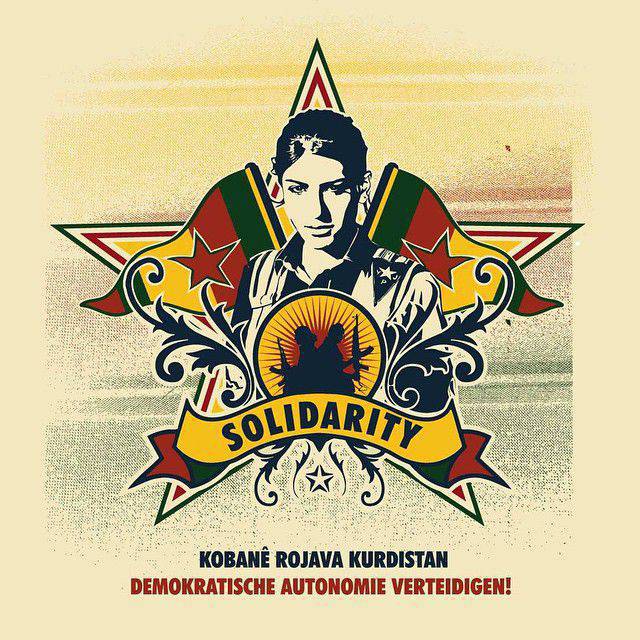
The management system in Rojava is represented by several levels of councils. The lower level is municipal councils, which are responsible for solving social and other issues of cities, districts and rural areas, but do not have their own budgets. Funding for the activities of municipal councils is carried out by the councils of the cantons - at the request of the "bottom". In addition, at the municipal level, there are "malagals" ("malagal" - people's house), which perform judicial functions. Malagals are made up of both men and women. It is Malagals who determine the severity of the deed, and impose punishment on the guilty, or send the case to the courts of a higher instance - to the level of the cantons. In the event that the punishment is related to imprisonment, the defendant is handed over to the Asaish, the Security Forces, which also perform law enforcement functions. In all self-government bodies and judicial instances of Rojava, women make up at least half of the delegates and representatives. Similarly, the representation of national minorities is also carried out. Since 70% of the population of Rojava are Kurds, and 30% are Arabs and Assyrians, the chairmen of the executive bodies and their deputies are chosen from Kurds, Arabs, and Assyrians. The legislative councils at the municipal and cantonal levels are recruited according to the same principle.
The militia is formed voluntarily
Armed forces are subordinate to the organs of self-government. They are divided into three types: YPG - National Self-Defense Detachments, YPJ - Women's Protection Forces, and Asaish - Security Forces. In contrast to the mixed units of YPG, YPJ are armed units, staffed exclusively by women and girls. Girls over the age of 17 can, at their own request, take an 15-day course of military training, but if girls or women choose to take part in battles against the IG, they must be at least 20 years old. Those girls who are not 20 years old can assist the Kurdish militiamen by working in the rear and providing self-defense units and medical care. Even Western feminists were forced to admit that currently Syrian Kurdistan is the conduit for gender equality in the Middle East region, pushing Israel, which was once considered an outpost of democracy and gender equality in the Middle East, on the secondary positions. Sometimes women even become authoritative field commanders. Thus, the forty-year-old Maisa Abdo, better known under the pseudonym "Narin Afrin", was elected by direct vote of the fighters of the units to the post of commander of the Kurdish national self-defense units in the canton of Coban, where the most violent battles of Kurdish militias against the IG forces were deployed. The girls and women fighting in the ranks of the Kurdish militia are inspired by the examples of their heroic predecessors - the partisans of the resistance of the Kurdistan Workers' Party against the Turkish government forces in the 1980-1990-s. So, one of the most revered among women - the heroin militia is Gulnaz Karatash, better known under the pseudonym "Beritan". This activist of the Kurdistan Workers' Party died heroically in 1992. She covered the retreat of her comrades to the last patron, and then rushed down the cliff.
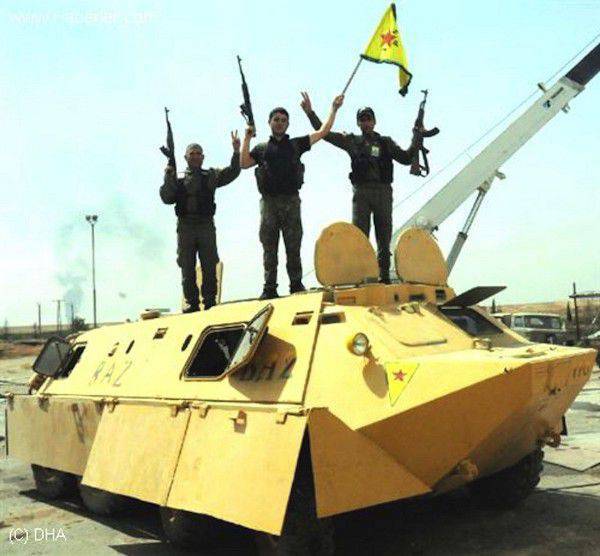
As for the organization of the armed militia of the Kurdish cantons, it is distinguished by several key features. Firstly, the principle of democratic self-government and the election of commanders dominates in Kurdish formations. At the same time, a person of any age, nationality or even gender can be elected commander. In mixed units, it is not uncommon for women to command platoons of men. Since the commander is chosen by the fighters, the right to command can only be earned with your knowledge, courage and human qualities, but not be served by a higher authority. Secondly, Kurdish formations are completed exclusively on a voluntary basis. However, there are cases of mobilization, but the latter refers to extremely dangerous situations when the enemy literally approaches the village. The chairman of the council of the federal national-cultural autonomy of the Kurds of Russia, Farhat Patiev, notes that in this case too, the forced mobilization is primarily advisory in nature. A militia can be sent to the front only at his own request. In addition, unlike the Islamic State, Kurdish armed groups do not use underage teenagers as fighters. The maturity of militias is the third main characteristic of the Western Kurdistan People’s Self-Defense Forces, fighting on the front lines. One of the main problems of the Kurdish self-defense units is the insufficient level of material and technical equipment and weapons. Most of the weapons are captured, recaptured as a result of battles at the Islamic State units. First of all, this applies to tanks and armored personnel carriers. The Self-Defense Forces do not have their own artillery, and the number of mortars is not enough. Unlike the Iraqi Kurdistan militia, supplies weapons being implemented by the United States, Syrian Kurds are forced to rely on their own resources, because the US leadership has a negative attitude towards the Kurdistan Workers' Party and the Kurdistan Democratic Union. After all, the social experiment carried out by Kurdish revolutionaries in Northern Syria, runs counter to the plans of the United States in the Middle East.
A significant number of foreign volunteers are also fighting in the ranks of the Kurdish militia in Rozhava today. These people come to Syrian Kurdistan, guided, first of all, by ideological considerations or by a thirst for adventure, but by no means by a desire to earn - after all, participation in volunteer troops is not paid. Among foreign volunteers, the most significant part is made up of representatives of Kurdish diasporas from all countries of the world. Hundreds of ethnic Kurds are sent to Rozhava from Germany, Sweden, Norway, Denmark, Switzerland and some other states where there are numerous Kurdish diasporas. At the end of 2011 in Cologne, the Kurdish biker club "Midian Empire" was organized, and later its members went to fight in the ranks of the Kurdish militia in Coban. At least 200 young Kurds left Sweden for Syrian Kurdistan - these numbers are called in the National Kurdish Association of Sweden.
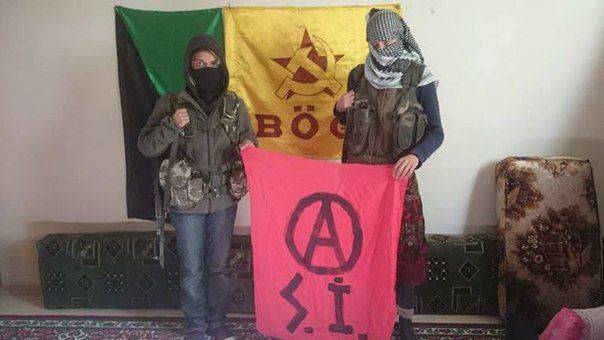
European and American left-wing radicals are in second place - communists, socialists and anarchists who go to fight for Rozhava, seeing in her a beautiful modern analogue of historical social experiments, like Revolutionary Spain or Soviet Russia. Some of the internationalist volunteers have already lost their lives fighting against religious fanatics in the territory of Syrian Kurdistan. For example, in February 2015, Australian volunteer Ashley Kent Johnston died - one of the first internationalist volunteers who died in Rojava. Two weeks later, Konstantinos Scafield died - a British citizen of Greek descent, a former marine, who had good combat skills and passed on his experience to Kurdish militiamen. In early March, 2015 was killed by German citizen Ivan Hoffman, who volunteered for Rozhava. 6 July 2015. Kevin Yokim, a volunteer from Germany who fought in the ranks of the Kurdish militia from November 2012 and took part in a number of battles, died in the battle near the village of Sergirat. It is indicative that the FRG authorities arranged bureaucratic obstacles during the delivery of Kevin’s body to his native Karlsruhe and only 14 of August were able to bury the young man at home. In July, 2015 was killed 23-year-old Australian Reese Harding - he fought in the ranks of the Kurdish militia for only two months and hit a mine during a night operation. In June, 2015 killed US citizen Keith Lewis Broomfield, who from February 2015 fought in the Kurdish militia. In the summer of 2015, the International Freedom Battalion was created as part of the Popular Self-Defense Forces of Western Kurdistan, which included volunteers from a number of European and Asian states, primarily the communists and anarchists, who came to Rozhava for ideological reasons. “The Revolution of Rozhava is now the Paris Commune under German siege. Madrid in the Spanish Civil War and Stalingrad during World War II,” the internationalist battalion released in June 2015 drew a message. Many European and American left-wing teams draw parallels between collecting and sending international brigades. in belligerent Spain during the Civil War and the current situation around the Rozhava. Some of the European leftists who go to war in Kurdistan are direct descendants of anti-fascist volunteers who took part in the Spanish Civil War.
However, in addition to the ideological left, among the international volunteers there are professional military of the Western armies who traveled to Kurdistan to continue their “personal war”. They hate religious extremists and have enough combat experience to effectively fight against the IS militants. It is indicative that the IG pays 500 dollars for the head of each volunteer, knowing full well that among the latter there are many people with military knowledge and skills who can transfer them to Kurdish militiamen. The largest group of military professionals fighting in the ranks of the Kurdish self-defense forces is the former members of the American army who have experience of fighting in Iraq and Afghanistan: “Jeremy Woodard is a Mississippi war veteran of Iraq and Afghanistan. Demobilized in 2012 year. I could not look calmly at the mass executions, arranged by the Caliphate, and on my own I reached Syria. In October, he was already actively fighting shoulder to shoulder with the Kurds against the Islamists. Brian Wilson is a veteran of the war in Iraq. 43 of the year. Originally from Ohio. Fights since October against the Islamists east of Cobán. He was inspired by the courage of the Kurds, alone fighting against the Islamists. Jordan Matson is a former US Army soldier. 28 years. Originally from Wisconsin. Religious. I could not calmly look at the massacres of Christians in the Middle East. He joined the Kurdish detachments of people's self-defense (quoted in: Western Inter-Brigade vs Caliphate // http://navoine.info/interbrig-vsisis.html). Interestingly, many European rightists are going to fight for the left of the Rozhava today. They have their own motivation - the protection of Christianity in the Middle East and the help of co-religionists, exterminated militants of the "Islamic state". In the ranks of the Kurdish militia fighting Christian battalion "Sutoro", among the fighters of which are citizens of Germany, Sweden and Switzerland of Kurdish origin.
World left and Kurdish Rozhava
The Kurdish National Movement in Syria is meeting more and more sympathy and recognition from the world community, including world-famous left-wing intellectuals. In December, 2014 was visited by a delegation of European and American intellectuals - David Greber, Antonia Davidovich, Thomas Miley, and even Janet Beale - Murray Bookchin's widow, whose ideas had a decisive influence on the political ideology of the Kurdistan Workers' Party at the present stage of its existence. The purpose of the expedition was to study the experience of political self-organization of the Kurdish population in Syrian Kurdistan. Professor David Harvey is considered to be one of the most authoritative neo-Marxist sociologists and geographers in the modern world. According to him, in Rozhava “attempts are being made to create an anti-capitalist system based on self-sufficiency. It involves the construction of communes, collectives and cooperatives. Also, important steps were taken in the field of education ”(David Harvey: Rozhava needs to be protected // http://hevale.nihilist.li/2015/07/professor-de-vid-harvi). According to Harvey, the activities of the Kurdistan Workers' Party and the Kurdistan Democratic Union are a logical result of the evolution of Marxist-Leninist teaching, in contrast to the dogmatic variations of Marxism - Leninism, which have long lost their revolutionary and progressive content. At the same time, the Kurds will also have to face a number of serious economic and social problems if the experiment in Rojava continues. Moreover, the blockade of the region, which on the one hand is carried out by the armed forces of the Islamic State and other religious fundamentalist organizations, contributes to the worsening of the economic situation of the Rozhava, and on the other hand, Turkey has blocked roads to Syrian Kurdistan. Questions and policies of Iraqi Kurdistan, which today is increasingly acting in the interests of Turkey and the United States, but does not care about the real interests of fellow tribesmen - the Kurds living in Rojava. In addition, there are a large number of refugees on the territory of Rozhava, not only the Kurds, but also Assyrians, Armenians, Christian Arabs, Alawites, representatives of other ethno-confessional groups who fled from other regions of Syria, where fierce fighting is taking place or Islamic power is established. state. " For them, Rozhava is an ideal refuge, since there is no religious and ethnic discrimination, and the fighting capacity of the Kurdish militia inspires some confidence that the IS militants will not be able to occupy the territory of Syrian Kurdistan.
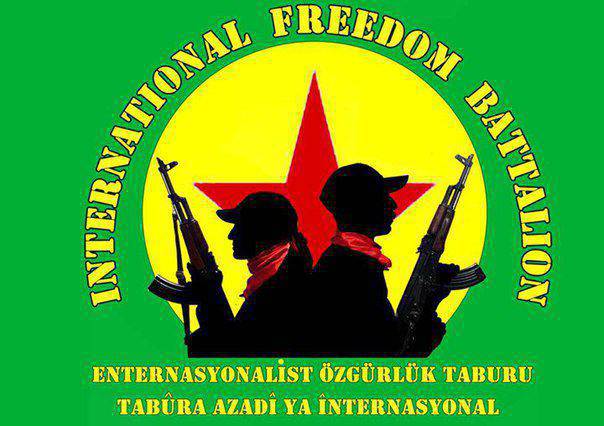
According to the British sociologist Jost Jongerden - the author of numerous works on the Kurdish national liberation movement, Rojava is an agricultural region and, of course, will face certain socio-economic problems. However, the scholar considers the practice of combining struggle in all directions - the Democratic Union of Kurdistan, fighting against the “Islamic state” and at the same time defending the ideas of self-determination of Syrian Kurds, does not defer the issues of struggle for social liberation and discrimination against women, gradually introduces the idea of equal accessibility. education for both sexes. It can be said that a real cultural revolution is taking place in Syrian Kurdistan. The once culturally backward region is turning into a citadel of freethinking in the Middle East. Thus, Jongerden reports that a large number of works of European and American left-wing philosophers and sociologists translated from Kurdish from Antonio Gramsci to Immanuel Wallerstein are sold in bookstores of Rozhava. Naturally, a few years ago this was impossible to imagine. But today, the rapid cultural revolution in Syrian Kurdistan is a fait accompli, as is the development of comprehensive links between the Kurdish national liberation movement and progressive and left-wing organizations in all countries of the world, the growing support for Kurdish resistance from prominent thinkers, cultural figures and ordinary citizens on all continents.
Turkey is a dangerous enemy
The main threat to Rozhava today is Turkey, which seems to support the fight against the "Islamic State", but in reality it is much more concerned about the suppression of the Kurdish national liberation movement. The emergence of Kurdish autonomies on the Turkish border is Ankara's nightmare, which is gradually coming true. And if the Turkish government managed to find a common language with Iraqi Kurdistan, then Syrian Kurdistan is seen as an enemy, first of all because Syrian Kurds are closely connected with Turkish tribesmen, with the struggle of the Kurdistan Workers' Party. The Turkish leadership treats Syrian Kurds much less tolerantly than Islamic radicals. Ankara is ready to even indulge the success of the IG in Syria and Iraq, if only the Kurds did not achieve real autonomy or state sovereignty. In fact, the Turkish authorities do their best to prevent the Syrian Kurds from fighting against the Islamic State. They blocked the border with Syria and arrested activists of the Turkish Kurdish movement, heading to help their fellow tribesmen in Syria. Naturally, humanitarian supplies collected by Turkish Kurds are not allowed into Syria either. At the same time, the Turkish special services turn a blind eye to the activities of the Islamists on the Turkish-Syrian border, and in some places supply the Islamists with weapons, counting on them to deal with the Kurdish popular movement (for information: http://hevale.nihilist.li/2015/07/ antifashisty-stokgolma). As Recep Erdogan stated, “Turkey will never allow a Kurdish state to be established on its southern borders in Syria. Ankara will make every effort so that this plan will never be implemented, regardless of the price of the issue ”(quoted in: Yusin M., Kuznetsova O. Turkish-Islamic State // http://www.kommersant.ru/doc/2757222 ). Thus, Turkey has officially demonstrated its position on the Syrian Kurds. Naturally, such statements by the highest officials of the Turkish state could not but provoke a stormy protest reaction of the numerous Kurdish population of Turkey. Clashes between the Kurdish youth and the Turkish right began even on the streets of European cities.
In late August, mass unrest took place in Istanbul, organized by activists of the Revolutionary Patriotic Youth Movement - the youth wing of the Kurdistan Workers' Party. Kurdish youth protested the killing of seven civilians by Turkish soldiers, including a seven-year-old boy, in Sirnak province. The protest demonstration turned into a clash with the police. Also, the militants of the Workers Party of Kurdistan police bus was blown up. In the city of Dersim, in Northern Kurdistan (Turkey), PKK partisans attacked the police station. The opposition of Kurdish revolutionaries to the Turkish government has spread to the countries of Western Europe, where numerous Turkish and Kurdish diasporas live. In Switzerland, on the night of 26 August 2015, the car of the Consulate General of Turkey was burned. True, the responsibility for this action was taken not by the Kurds, but by the Swiss anarchists, who expressed their solidarity with the national liberation struggle of the Kurdish people. September 3 The guerrillas with Turkish officers were blown up by partisans in the territory of the Turkish Mardin province bordering on Syria with Turkish officers. 2015 September 6 in Diyarbakir Kurdish partisans fired Turkish policemen with a grenade launcher, killing two law enforcement officers. Only within a month, the Turkish armed forces and police, as a result of the attacks of Kurdish partisans, lost about 2015 officers and soldiers. That is, a new armed conflict is unfolding on the territory of Turkey itself, which can under certain circumstances develop into a real and bloody civil war of the Kurds and left forces of the country against the Turkish government.
The whole world watched the events unfolding around the city of Cizre. Recall that this settlement in the territory of Turkish Kurdistan, was blocked by Turkish troops, because in its vicinity and in the city itself a military operation took place against the detachments of the Kurdistan Workers' Party. In the seven days of the blockade, at least 30 civilians died. The Turkish leadership tried to pass off the dead as activists of the banned Kurdistan Workers' Party. After the curfew in Cizra was lifted, Salahattin Demirtas, co-chairman of the Democratic Party of Peoples, the largest pro-Kurdish political party in Turkey, spoke in the city. Demirtas demanded that the Turkish leadership indicate who exactly among the dead was a member of the Kurdistan Workers' Party, promising that if at least one PKK member was found among the dead, he would resign. Demirtas accused the Turkish leadership of seeking to kill the Kurdish people by armed means and promised that sooner or later all those responsible for the destruction of civilians would be held accountable for their actions. Thus, the internal political confrontation between the Kurds and the Turkish government is developing incrementally, but the Turkish government is not taking any steps towards stabilizing the situation. Erdogan also does not intend to abandon the policy of persecution of Kurdish activists and the blockade of Syrian Kurdistan, which contributes to the increasing tension of internal political tension in Turkey, as well as the decline of Ankara’s prestige at the global level - after all, actions against Kurdish oppositionists in the general context of the situation in the Middle East can be perceived no differently , as the tacit support of the "Islamic state" - the main enemy of the Kurds in Syria and Iraq. However, the aggressive policy of Turkey towards the Kurds finds a certain understanding on the part of the United States and a number of European countries interested in weakening all anti-imperialist forces in the Middle East.
The world today is increasingly facing the Kurds. If the Kurdish movement succeeds in realizing a grand social experiment in Rozhava by successfully repelling the IS attacks and defending itself against the hostile policies of the Turkish state, the Middle East can acquire a new powerful center of attraction for all progressive forces, a genuine secular alternative to radical fundamentalism.
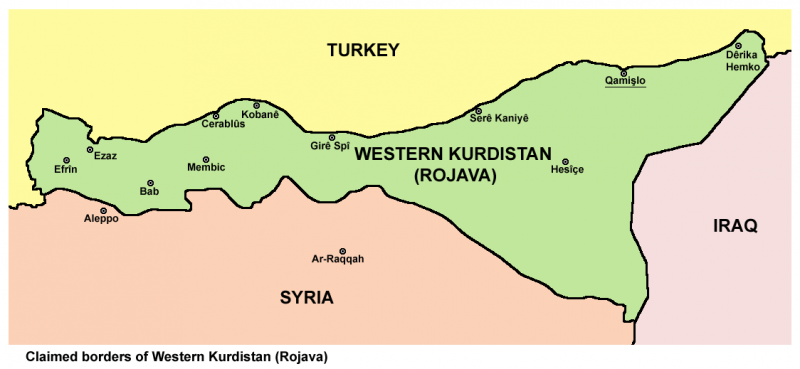
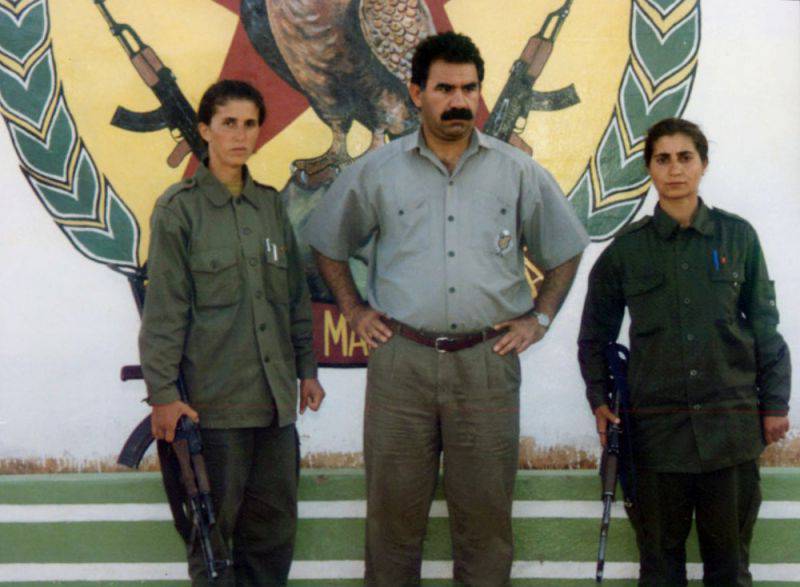
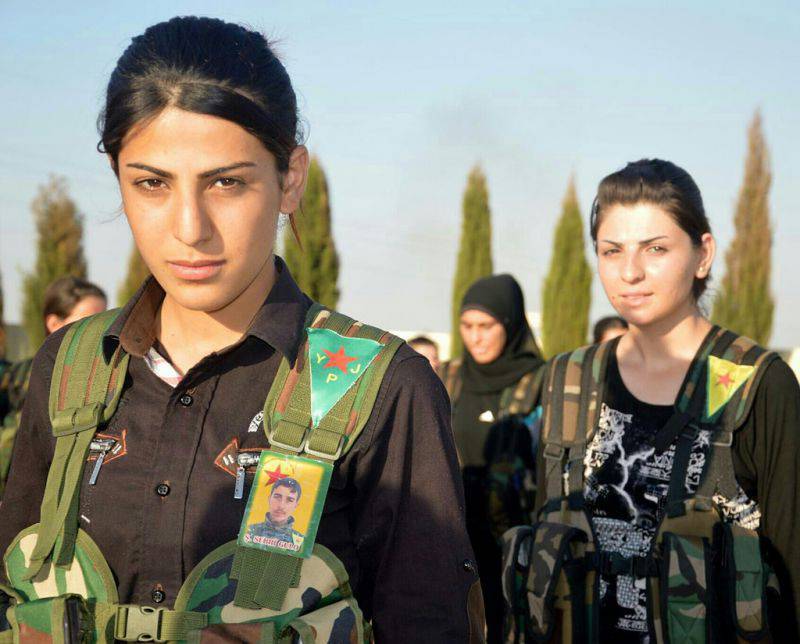
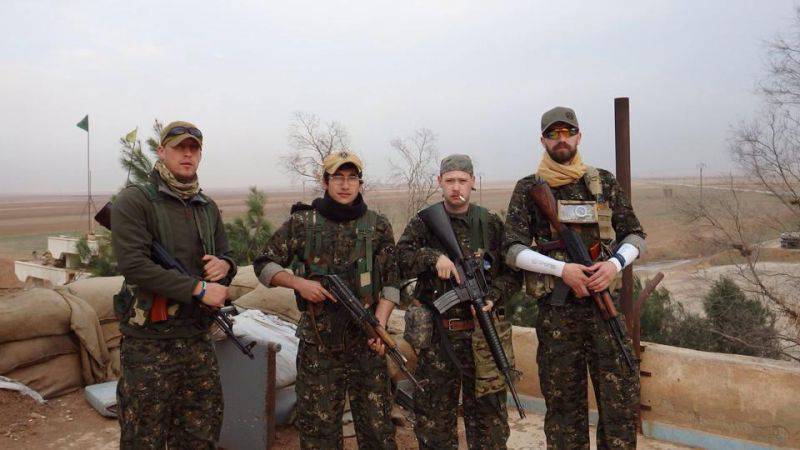
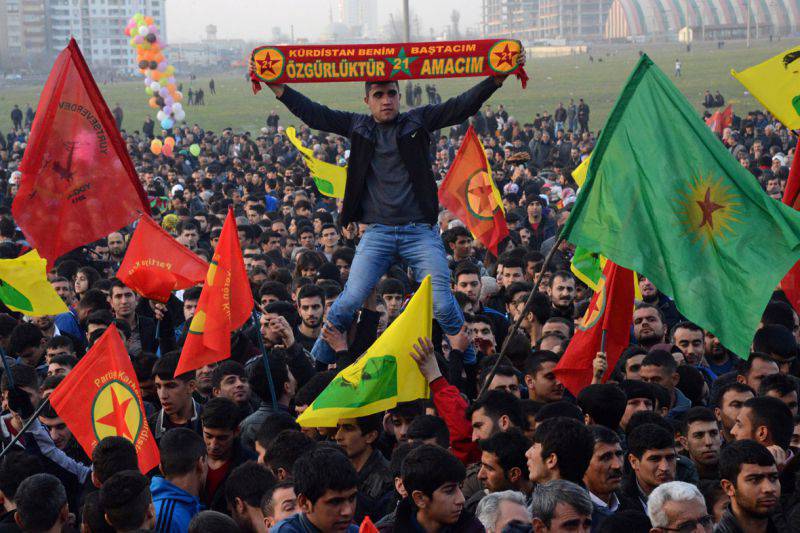
Information